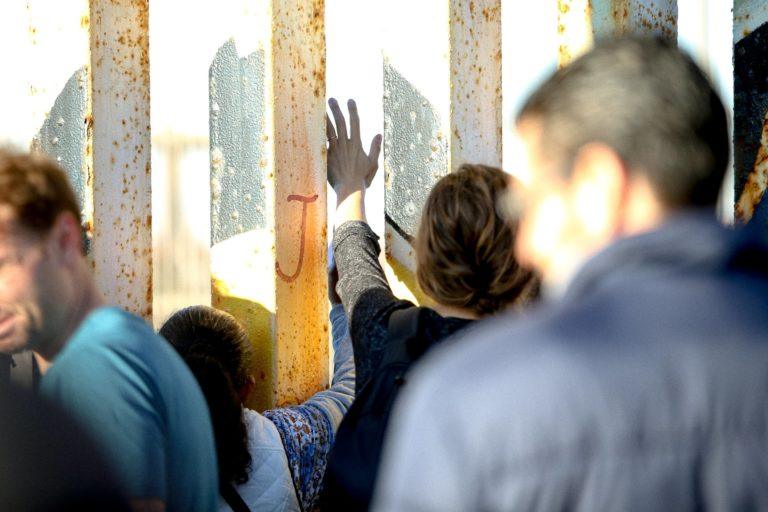It’s happening again.
Children, many of which under the care of their family members, are fleeing violence in Central America. They’re running from nightmarish levels of danger that are the predictable outcomes of near-sighted policy decisions and militaristic interventions. They’re running from the greedy politicians who have emerged to fill the leadership vacuums that our global chess matches have created. They’re running from the cartels who are armed with US-made guns and who are working diligently and successfully to satisfy our appetites for illicit drugs. They’re running from a dangerous present and a hopeless future.
They’re running north, fueled by the international promise of hospitality to those fleeing violent persecution and naive to the truth that we change our rules in order to keep them out.
Thus, rather than running into our generous embrace, they’re running into the jaws of a system that we (fueled by our distorted understanding of Christian faith) have created. It’s a system that willfully and very publicly prefers light skinned to dark skinned human beings. It’s a system that separates children from their parents as a strategy to deter other traumatized families from making the journey. It’s a system that places hundreds of innocent and fully dependent children in cages that were originally designed for a handful of violent offenders.
It’s a desperately broken system that can change if we have the agency to change it.
In our Immersion Trips, our delegations regularly meet with men, women, and children, our Central American siblings, who share with us stories of breathtaking abuse. Husbands found murdered on front door steps with letters of extortion stabbed into their chests. Wives and mothers raped in front of their families. Children kidnapped and held for ransom. Babies thrown against brick walls in the presence of their mothers. Women enduring debilitating violence by multiple gang rapes. We’ve come to discover that these stories are not anomalies. They are common…the shared experience of those who have fled the terror of home for the unknown.
The secondary trauma that we absorb is real…and it is nothing compared to the hell that they have endured in order to reach our southern border.
Believe it or not, those whom we are humbled to meet, learn from, and hold within the shelters of Tijuana are the lucky ones. For, while they are still in danger, they are together. Sadly, in this writing, thousands of children, from infants to teenagers, find themselves in lice & human waste infested privatized prisons north of the border, separated from those who loved them enough to risk the journey in pursuit of refuge.
All of this is outrageous. And all of it was preventable.
You see, this isn’t the first time women and men, along with their children, have fled violence within their home countries. It’s not the first time that wave after wave of impoverished, traumatized siblings have made their way to the shadow of the Empire in order to seek refuge among us…the most powerful, wealthy, and “churched” country in the history of the world. This isn’t the first time that we have ripped innocent children from the arms of their parents as yet another act of violence against an already over-violated beloved image bearer.
The truth is, it happens over and over again. Yet, it’s only when our social media feeds fill with the stories of children dying in the hands of US officials who have sworn an oath to uphold unjust systems rather than to defend the dignity and safety of children that we ask the question: “What can I do?”
“What can I do?”
It’s an excellent question…a reactive, sympathetic, and necessary one.
It’s the question we repetitively ask when faced with the visceral and very uncomfortable truth about us, what we’ve created, what we’ve perpetuated, what we’ve turned a blind eye to for far too long, and what we’ve benefitted from. It’s the question we ask every time the headlines remind us that the success of our system and our preferred standard of living demands that we consume others. It’s the well-intentioned question we ask from our places of privilege in order to absolve ourselves from the shame that comes from the knowledge that we are complicit in the disasters of the violence they suffer, the journey they’ve endured, and the separation & detention that is now their fate.
It’s the same, essential, very good question we asked the last time this happened.
No doubt, like it was then, it is being answered by compelling non-profit organizations who are starved for resources and overworked yet participating in heroic acts of justice, advocacy, and peacemaking. “What can I do?” was and is met with invitations to invest financially, volunteer locally, learn diligently, advocate passionately, pray consistently, and lament urgently.
All of these are essential, very good things. Your response to Global Immersion’s invitations to take these very actions has catalyzed a movement of comprehensive, dignifying shelters throughout Tijuana that is under the careful discernment and wise leadership of our Mexican teammates. For the sake of stability, hope, and restoration for both those who are creating the spaces and also for those who are finding refuge in these shelters, we invite you to continue to INVEST…with courage and with generosity. We also recommend investing with our partners HERE, HERE, and HERE.
And yet, we wonder about a dangerous cycle that we all seem to be caught in. It goes like this:
- tragedy hits the headlines
- we ask, “What can I do?”
- our question is met with the six opportunities I mention above
- many of us invest
- some of us volunteer
- a couple actually begin a learning journey
- a few make a call
- we pray…for a while and remain confused about what lament really is
In short time, the urgency of the moment passes and with it, our experience of outrage that this kind of atrocity still happens in our world. Our momentary investments made and our consciouses cleared, we no longer wonder how we can become a part of changing the way the world works so that this doesn’t EVER happen again…anywhere.
You know the power brokers who are innovating and perpetuating the violence behind all of this? They know this about us. They know that when things are seemingly at their worst, we’ll enact the aforementioned cycle, investments will be made, and nothing will change. They know that, so long as the only question we’re asking is “What can I do?” all they have to do is wait us out for a bit and let our outrage and generosity subside before they continue to wreak havoc on those our system has trained us to ignore.
And then, with a tragic headline or a devastating picture, the cycle starts over.
At Global Immersion, our conviction is this: If you want to change the world, start by changing the question.
While “What can I do?” is an important wondering, the question “Who must I & we become?” is far more critical. For this question demands that we engage not simply in periodic acts of benevolence, but in the process of becoming different kinds of people: people who show up, daily, for the long term, in committed and restoratively collaborative ways.
Beware: this question is more costly. It’s wildly inefficient. And, our oppressed & occupied relatives cannot afford to wait for the learning curves of we, the privileged few.
Yet, here’s the bottom line: unless we do the work to become a different kind of people, a cross-shaped people marked by resolve, conviction, and creative love, atrocities like child detention (and the sympathetic cycles that follow) will only continue…and worsen. Unless we demand our own transformation, we will continue to trample people and then act surprised when it happens.
So…yes…do something. Invest. Volunteer. Learn. Advocate. Lament. Pray.
And…let’s change our question to “Who must I & we become?”
If you’re ready to make this shift, then Global Immersion is ready to walk the road with you. START HERE by viewing our webinar entitled, Doing to Becoming: An Essential Shift for Everyday Peacemakers and downloading THIS free toolkit.
[button new=”yes” title=”Click HERE to donate to borderlands fund” link=”https://globalimmerse.org/donate/borderlands/”]
 Author: Jer Swigart – Cofounding Director of Global Immersion Project.
Author: Jer Swigart – Cofounding Director of Global Immersion Project.

